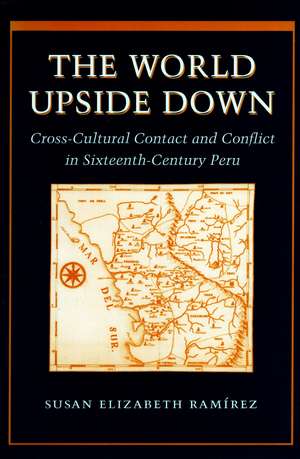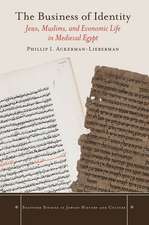The World Upside Down: Cross-Cultural Contact and Conflict in Sixteenth-Century Peru
Autor Susan Ramírezen Limba Engleză Paperback – 30 sep 1998
The old saying that “history is written by the victors” certainly applies to most of the history of European colonialism in Spanish America. However, in recent decades scholars have begun to study the Spanish conquest and early colonialization of America from the point of view of the native Americans in an attempt to right this imbalance. Taking the perspective of the vanquished, the author aims to determine and explain some of the general principles on which the pre-Hispanic Andeans’ lives were based.
The book describes how the imposed Spanish colonial system altered the organization and belief systems of the native inhabitants of northern Peru during the first fifty years or so after the Spanish conquest. By centering on an area that was incorporated into the Inca empire relatively late (1460’s-70’s), the book offsets the Cuzco focus of much of the existing literature in Inca history and culture. It explores the impact of expanding colonialism on indigenous ideas about leadership and legitimacy, the supernatural and morality, land tenure, service and allegiance, and wealth.
The book describes how the imposed Spanish colonial system altered the organization and belief systems of the native inhabitants of northern Peru during the first fifty years or so after the Spanish conquest. By centering on an area that was incorporated into the Inca empire relatively late (1460’s-70’s), the book offsets the Cuzco focus of much of the existing literature in Inca history and culture. It explores the impact of expanding colonialism on indigenous ideas about leadership and legitimacy, the supernatural and morality, land tenure, service and allegiance, and wealth.
Preț: 194.01 lei
Nou
Puncte Express: 291
Preț estimativ în valută:
37.12€ • 38.97$ • 30.81£
37.12€ • 38.97$ • 30.81£
Carte disponibilă
Livrare economică 20 martie-03 aprilie
Preluare comenzi: 021 569.72.76
Specificații
ISBN-13: 9780804735209
ISBN-10: 0804735204
Pagini: 252
Dimensiuni: 151 x 228 x 18 mm
Greutate: 0.35 kg
Ediția:1
Editura: Stanford University Press
Colecția Stanford University Press
ISBN-10: 0804735204
Pagini: 252
Dimensiuni: 151 x 228 x 18 mm
Greutate: 0.35 kg
Ediția:1
Editura: Stanford University Press
Colecția Stanford University Press
Recenzii
"This is a significant contribution to the field. . . . The careful and sophisticated analysis of the indigenous view of the effects of the Spanish invasion is a model of how to do ethnohistory."—Journal of Social History
"An impressive and valuable contribution to our understanding of Andean ethnohistory."—The Americas
Notă biografică
Susan Elizabeth Ramírez is Professor of History at De Paul University.
Textul de pe ultima copertă
“This is a significant contribution to the field. . . . The careful and sophisticated analysis of the indigenous view of the effects of the Spanish invasion is a model of how to do ethnohistory.”—Journal of Social History
“An impressive and valuable contribution to our understanding of Andean ethnohistory.”—The Americas
“An impressive and valuable contribution to our understanding of Andean ethnohistory.”—The Americas
Descriere
This book describes how the imposed Spanish colonial system altered the organization and belief systems of the native inhabitants of northern Peru during the first fifty years or so after the Spanish conquest. By centering on an area that was incorporated into the Inca empire relatively late (1460's-70's), the book offsets the Cuzco focus of much of the existing literature in Inca history and culture.












